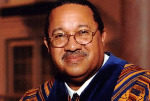Editor’s Note: This is Part 9 of Reverend Lacy’s ongoing series of Godly relationships and you can find the entire series under his page here.
Proverbs 23:7a teaches:
“For as he (Hebrew: a primary word, 3rd person pronoun, singular, he (she or it) thinketh in his heart, so is he:….”
This Proverb is Literal
A psychology professor expressed it this way: “Words set in motion those things which are spoken.” My forty years of teaching/counseling has proven this to be true whether we think this “in our heart” about our selves and others or express it verbally.
A life-lesson to Learn
This came home to me in my early years as a jail chaplain.
Shorty was serving two years for petty larceny. His size and lack of education did not equipment him very well for life inside or outside of jail. He was quiet and kept to himself. One day he asked to talk with me.
I opened with my usual question: “Shorty, what’s going on that I ought to know about?”
He immediately went to the heart of the matter. “They always said I would grow up to be like Uncle Willie.”
“Tell me about Uncle Willie.”
He dropped out of school and started hanging out on the street with the wrong people. He couldn’t keep a job. He was always in trouble. He was in and out of jail. Uncle Willie was no good.”
“Tell me about your life.”
“Ditto Uncle Willie.”
I am not a blame-shifting counselor, but his direction in life had been cast, in part, by the words spoken to him. Shorty did the crime; Shorty was doing the time. However, a factor in his depression was his sense of hopelessness – he was destined to become “…just like Uncle Willie.”
Comparison is Spelled k-i-l-l-e-r!
Every time we make a comparison we could be putting something or someone to death. Comparison is the heart of the advertising industry. The lesser product is usually called Brand X, which is never a complimentary term.
Often one person’s attributes are pointed out to some one to encourage them to be better or do better. This is not always a bad thing. However, those being encouraged this way may think of themselves as Brand X. They think, as Shorty thought, I’m no good. I’ve never been any good. I’ll never be any good.
We learned in a previous lesson to attack the problem and not the person. This prevents problems from developing. This same admonition applies to making comparisons.
We are still following the general prescription: An ounce of prevention is worth a pound of cure.
 Rev. Thomas (Tom) C. Lacy, Advisory Board Member of the Virginia Christian Alliance and Founder and Director, of New Hope Counseling Service and on the Board of Advisors of the Virginia Christian Alliance
Rev. Thomas (Tom) C. Lacy, Advisory Board Member of the Virginia Christian Alliance and Founder and Director, of New Hope Counseling Service and on the Board of Advisors of the Virginia Christian Alliance




